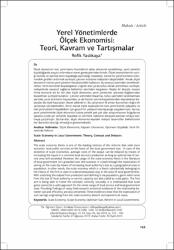Yerel Yönetimlerde Ölçek Ekonomisi: Teori, Kavram ve Tartışmalar
Abstract
Ölçek ekonomisi tezi, yerel kamu hizmetlerini daha ekonomik sunabilmeyi, yerel yönetim büyüklüğünde arayan reformların temel gerekçelerinden biridir. Ölçek ekonomilerinin varlığı halinde ve optimal tesis büyüklüğü aşılmadığı müddetçe, somut bir yerel hizmetin üretimindeki girdileri arttırmak suretiyle, çıktının ortalama maliyetleri düşürülebilir. Ancak, ölçek ekonomisi tezinin yerel yönetim literatüründeki kullanımı, bu senaryo üzerinden temellendirilmez. Yerel otoritenin büyüklüğünün, coğrafi alan ya da nüfus olarak arttırılması suretiyle, maliyetlerde tasarruf sağlama beklentisi üzerinden kurgulanır. Başka bir deyişle, esasen firma teorisine ait bir tez olan ölçek ekonomisi, yerel yönetimler alanında bağlamından koparılmak suretiyle kullanılır. Çıktının üretimden koparılıp, nüfus üzerinden tanımlanması yanında, yerel otoritenin boyutundan ya da hizmet sunma kapasitesinden kaynaklanan kazançlar da ölçek kazançları olarak adlandırılır. Bu çalışmanın ilk amacı kavramları doğru bir çerçeveye oturtabilmektir. İkinci olarak ölçek kazançlarının tüm yerel hizmet yelpazesi ve tüm yerel yönetim büyüklükleri için geçerli bir yaklaşım olamayacağı vurgulanmıştır. Ayrıca, yerel yönetimlerde ölçek ekonomisi tezine yönelik pek çok alan araştırmasının bulgularına çalışma içinde yer verilerek, büyüklük ve verimlilik ilişkisinin deneysel kanıtları ortaya konmaya çalışılmıştır. Bu kanıtlar, ölçek ekonomisi kaynaklı maliyet tasarrufları beklentisinin her durumda karşılığı olmadığını göstermektedir. The scale economy thesis is one of the leading motives of the reforms that seek more economic local public services on the basis of the local government size. In case of the existence of scale economies, average costs of the output can be reduced by means of increasing the inputs in a concrete local service’s production as long as optimal size of service area isn’t exceeded. However, the usage of the scale economy thesis in the literature of local government isn’t grounded over this scenario. It is built through the expectation of saving on the costs by means of increasing local authority’s size as a geographical area or population. In other words, the scale economy which is a thesis substantially belonging to the theory of the firm is used in a decontextualized way in the area of local governments. With snatching the output from production and defining it via population, gains which arise from the size of local authority or service capacity are also called as scale gains. The first aim is being able to frame the concepts correctly. Secondly, it is emphasized that scale gains cannot be a valid approach for the whole range of local service and local government sizes. Providing findings of many field research, empirical evidences of the relationship between size and efficiency are also presented. These evidences show that the expectation of cost savings originating from the scale economy doesn’t correspond in all cases.
Source
Liberal DüşünceVolume
24Issue
95URI
https://doi.org/10.36484/liberal.612182https://app.trdizin.gov.tr/makale/TXpRek5EZ3pNdz09
https://hdl.handle.net/20.500.12587/13990
















